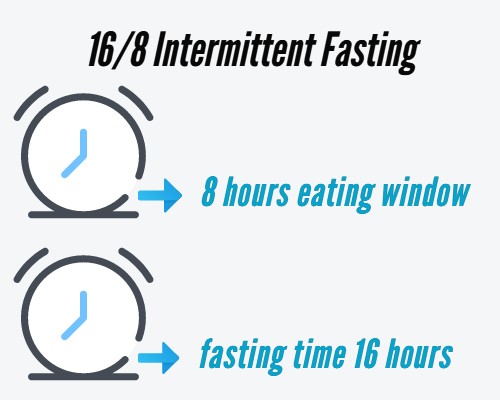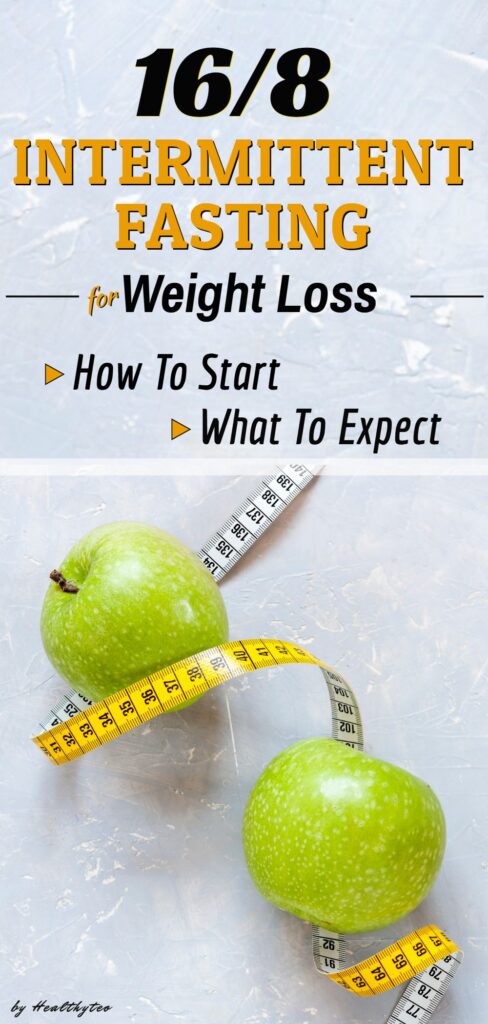16/8 intermittent fasting method: what is it, how to start fasting for 16 hours a day, and is it good for weight loss
The 16/8 intermittent fasting method or also called the 16:8 diet is one of the most popular fasting styles today. People who practice this type of fasting claim that this is an easy and sustainable way to improve overall health and lose weight.
If you’re a beginner with fasting and want to learn more about this eating pattern, you are at the right place.
In this article, you will find out what is 16/8 intermittent fasting, how to start fasting for 16 hours a day, benefits, and potential risks.
Also, if your goal is to lose weight by practicing this fasting method you can read how this eating pattern helps with weight loss and how much weight you can lose with a 16/8 diet.
This post may contain affiliate links, which means we may receive a small commission, at no cost to you, if you make a purchase through a link. For more information, please see our disclosure.
What is 16/8 intermittent fasting?
The 16/8 intermittent fasting is a type of time-restricting fasting, that involves abstaining from calories for 16 hours of the day and then eating within an 8-hour window.
Most people do this by starting a fast at night, skipping breakfast, and eating their first meal in the middle of the day, or they choose to eat between 12 p.m. and 8 p.m.
This cycle can be repeated as many days as you like – from once to twice a week to every day, depending on your personal preference.
16/8 intermittent fasting is so popular today, especially among those looking to lose weight and burn fat. This also called the 16:8 diet is easy to follow and can provide real results with minimal effort, while other diets often set restrict rules and requirements.

The best thing about this fasting method is that you can eat any type or amount of food during the 8-hour eating window. This flexibility makes this plan relatively easy to follow.
16/8 intermittent fasting
It is simple: Do not eat anything for 16 continuous hours, except for water, coffee, or tea, and then eat freely for the remaining 8 hours.
If you’ve never fasted before here is an article that will help you to learn more about fasting and different methods of intermittent fasting: What Is Intermittent Fasting And How Does It Work?
How to start 16/8 intermittent fasting
To start pick an 8-hour window and limit your food intake to that time span. Many people who practice this fasting method prefer to eat between noon and 8 p.m. and this is maybe the simplest way because you only need to fast overnight and skip breakfast but you can still eat a balanced lunch and dinner.
You may choose one of the following 8-hour eating windows:
- 9 a.m. to 5 p.m.
- 10 a.m. to 6 p.m.
- noon to 8 p.m.
Within this timeframe you can eat your meals and snacks, eating regularly is important to prevent blood sugar peaks and dips, and also to avoid excessive hunger. You can experiment and pick the time frame that best fits your schedule.
Once you decide on a general eating window it’s time to start with intermittent fasting. If you have some health problems it’s good to consult with your doctor before starting.
Also, if you’re a beginner with fasting you don’t need to go from the start to the 16-hour fast. You can start with a 12-hour daily fast and ease into a 16-hour fast.
Some experts suggest starting just a couple of days a week and working your way up, while others recommend starting with a 12-hour fast window and increase it to 14 and at the end to a 16-hour fast window.
It’s important to listen to your body, but if you’ve never fasted before it’s good to start with 12 and move up to 16 hours of daily fasting.
Foods to eat and avoid on 16/8 intermittent fasting
To maximize the potential health benefits of your 16/8 diet it’s important to eat nutritious whole foods and beverages during your eating periods.
Try balancing each meal with a variety of healthy foods like fruits, veggies, healthy fats, whole grains, and protein-rich foods.

Try sticking to the following foods on the 16/8 diet:
- Vegetables: Leafy greens and broccoli are especially good for making sure you’re eating enough fiber.
- Fruits: Bananas, berries, oranges, apples, and pears will offer good vitamin sustenance.
- Whole grains: Oats, rice, barley, whole grain pasta, and quinoa will keep you fuller for longer.
- Healthy fats: Avocados, coconut oil, olive oil.
- Protein: Poultry, meat, fish, eggs, and nuts will keep you full.
You can also drink calorie-free beverages like water, tea, and coffee (unsweetened), even while fasting. This helps you to control your appetite and also keeps you hydrated, which is very important.
If you want to know what to eat and avoid on this IF method you can find the full list of foods to eat and avoid on 16/8 intermittent fasting here!
Beverages you can consume while fasting:
- Water – Carbonated or plain water contains no calories and will keep you hydrated during a fast.
- Diluted apple cider vinegar – Drinking 1-2 teaspoons of apple cider vinegar mixed into the water can help you stay hydrated and prevent cravings during a fast.
- Coffee and tea – You can consume them without adding milk, sugar, or cream.
Some people drink coffee with MCT oil, ghee, or coconut oil during their fast. Oil breaks a fast but it won’t break ketosis and can tide you over meals.
Also, some people drink bone broth that is a rich source of nutrients and can help replenish electrolytes lost during long periods of drinking only water.
Drinks that contain any calories like bone broth or coffee with MCT oil will technically break your fast. However small amounts of these drinks won’t throw your body out of ketosis.
Read More: What To Drink During Intermittent Fasting
Foods to avoid during intermittent fasting:
There are certain foods that you shouldn’t consume as part of an intermittent fasting regimen. You should avoid foods that are calorie-dense and contain high amounts of fat, sugar, and salt.
They provide little to no nutrients, and they won’t fill you up after a fast, or even worse can make you hungrier.
Here are some examples of foods that you should avoid to maintain a healthy intermittent eating regimen:
- Snack chips
- Microwave popcorn
- Cookies, candy, cakes
- Barbeque sauce and ketchup
- Sugary cereals and granola
- Fruit juice
What to eat to break your fast
To break your fast you should eat small portions of foods that are easily digestible so you don’t overwhelm your digestive system.
Nutrient-dense foods that are easy to digest and contain a bit of protein and some healthy fats can break your fast more gently.
Here are some examples of what to eat to break your fast:
- Dried fruits: Dates are a good source of nutrients and are frequently used to break fasting in Saudi Arabia. Also, apricots and raisins may have similar effects.
- Smoothies: Great way to introduce nutrients to your body since they contain less fiber than whole, raw vegetables, and fruits.
- Soups: Soups that contain protein and easily digestible carbs can gently break fast. Avoid soups made with a large amount of high-fiber, raw vegetables, or heavy cream.
- Vegetables: Cooked, starch vegetables like potatoes can be a good food option when breaking a fast.
- Healthy fats: Avocado or eggs can be a good food choice to eat after a period of fast.
Breaking your fasting period with foods high in fat, sugar or even fiber can be difficult to digest and this can lead to discomfort and bloating. Once you’re tolerating gentler foods add in other healthy foods and return to eating normally.
If you wish to learn more about 16/8 intermittent fasting and what foods to eat here is an Intermittent Fasting 16/8 Cookbook that includes 50 delicious recipes for breakfast, lunch, dinner, and dessert.
Is 16/8 fasting good for weight loss?
Restricting your food intake to a few hours per day can help you to reduce the number of calories that you consume. There are some studies that show that fasting could boost metabolism and increase weight loss.
A study from 2017 published in the International Journal of Obesity showed that intermittent fasting leads to greater weight loss and fat loss in men with obesity than regular calorie restriction.
Also, research from 2016 reports that men who followed a 16:8 time-restricted feeding for 8 weeks in conjunction with resistance training showed decrease fat mass and also participants maintained their muscle mass throughout.
If you want to lose weight and have trouble sticking to restrictive diets or prescribed meal plans, then you may benefit from daily fasting.
A pilot study published in the Journal of Nutrition and Healthy Eating shows that a 16/8 fasting plan can help obese dieters lose weight without having to count every single calorie they eat.
Will I lose weight on the 16:8 diet?
In theory, yes. You might lose weight on this diet because when you fast, you are burning more fat for energy. This fat-burning and the metabolic shifts that come with it might increase your chances of losing weight.
Fasting puts your body into a state of ketosis – your body starts burning fat for energy instead of carbs. The time it takes to enter ketosis varies based on the individual, typically it takes anywhere from 12 to 32 hours of fasting. So, your 16-hour fasting window might have you covered.
How much weight can you lose on the 16/8 diet?
If you’re fasting 16 hours a day it’s important to match fasting with healthy eating and exercise. If you follow this, there is a typical weight loss of around 7 to 11 pounds (3-5 kilograms) over a ten-week period.
According to a review published in Molecular and Cellular Endocrinology, someone weighing just over 90 kg would lose 5% of their total body weight in the ten-week period.
On the other hand, some studies have demonstrated that there’s no difference between people who do intermittent fasting compared to those who count calories and cut back.
16/8 intermittent fasting method can help you to lose weight, but you must know that losing weight is not something that comes by following one diet or not eating some kind of food. To lose weight you should change your lifestyle.
Changing what you eat, more exercise, less stress. It is not so simple, but yes 16/8 fasting can definitely help you with your weight loss goals.
What are the benefits of fasting 16 hours a day?
As we mentioned before 16/8 intermittent fasting is mostly practiced by people to lose weight and it gives good results. In terms of health this type of fasting has been associated with a long list of benefits:
Decreased inflammation
Forms of intermittent fasting like the 16/8 diet rely on the concept that fasting reduces the oxidative stress on the body which can decrease inflammation and the risk of chronic disease. Cells within the body respond to intermittent fasting by shifting into repair mode.
When people eat on a regular basis the body doesn’t have time to shift into a fasting-repair mode, which may be one reason why heart disease and diabetes are so much more common today than a century ago.
Autophagy
Fasting is also a possible trigger of autophagy – the body’s way of cleaning out damaged cells, in order to regenerate newer, healthier cells.
Here is a reading for you about autophagy: what is it, and how to induce autophagy for amazing health benefits.
Improved blood sugar control
Intermittent fasting has been found to reduce fasting insulin levels by up to 31% and lower blood sugar by 3-6%, potentially decreasing your risk of diabetes.
Brain benefits
Time-restricted fasting, such as the 16/8 method may also protect learning and memory and slow down diseases that affect the brain.
Potential side effects and risks
This type of intermittent fasting, 16/8 plan is not for everyone and even it’s associated with many health benefits it does come with some drawbacks.
Potential side effects and risks of fasting for 16 hours a day include:
- hunger, weakness, and tiredness in the beginning stages of the plan
- overeating or eating unhealthy foods during the 8-hour window due to excessive hunger
- heartburn or reflux as a result of overeating
Restricting your food intake to just 8 hours a day can cause some people to eat more than usual during this eating period in an attempt to make up for hours spent fasting. This may lead to digestive problems, the development of unhealthy eating habits, and counter-effect such as weight gain.
Additionally, some research suggests that intermittent fasting may be less beneficial for women than men.
Some animal studies suggest that intermittent fasting could interfere with fertility and reproduction in females. 16/8 intermittent fasting is not suitable for those who are pregnant, breastfeeding, or trying to conceive.
However more human studies are needed to evaluate the effects of intermittent fasting on reproductive health.
If you are a beginner with intermittent fasting and you’re trying it for the first time, you should know that it can make you feel dizzy and nauseated and cause periods of low blood sugar and dehydration.
You must remember that you should drink water during fasting time. Despite the fact that most people on the 16/8 diet drink water, it may be not enough because you’ll miss the water from the food (food itself provides quite a bit of water).
Our advice is to start gradually with 16/8 fasting and consider stopping or consulting your doctor if you have any concerns or experience negative symptoms.
How often should you do 16/8 intermittent fasting?
Unlike other diets where you must eat strict types of foods at a strict time of the day, each day of the 16/8 works independently from the other days.
This means you can practice 16/8 intermittent fasting from one day to seven days a week. It all depends on your goals and the advice from your doctor.
Don’t change your eating pattern right away, listen to your body, you can start with one day weekly with 16/8 fasting and see how it affects your body.
You can go for two days weekly after a while but again consult with your doctor before going 16 hours without eating.
Experts suggest that a person needs to follow the basic rules for at least ten weeks to witness some positive results. Following the diet properly will help you to shed 7 to 11 pounds depending on your BMR (Basal Metabolic Rate).

Final thoughts about 16/8 intermittent fasting
16/8 intermittent fasting is one of the most popular forms of intermittent fasting that involves fasting for 16 hours and eating only during an 8-hour window. This method of fasting is good for fat loss, weight loss, and also for improving overall health.
This diet plan is easy to follow and gives good results but maybe it’s not for everyone. If your plan is to follow the 16/8 intermittent fasting diet you should speak first with your doctor or dietitian to make sure that this diet is good for you!
Disclaimer: All the information on this website is for educational purposes only. Nothing on this website should be considered as health or medical advice. Always consult with a doctor or trusted health professional before following any dietary, nutritional, or herbal recommendations.




